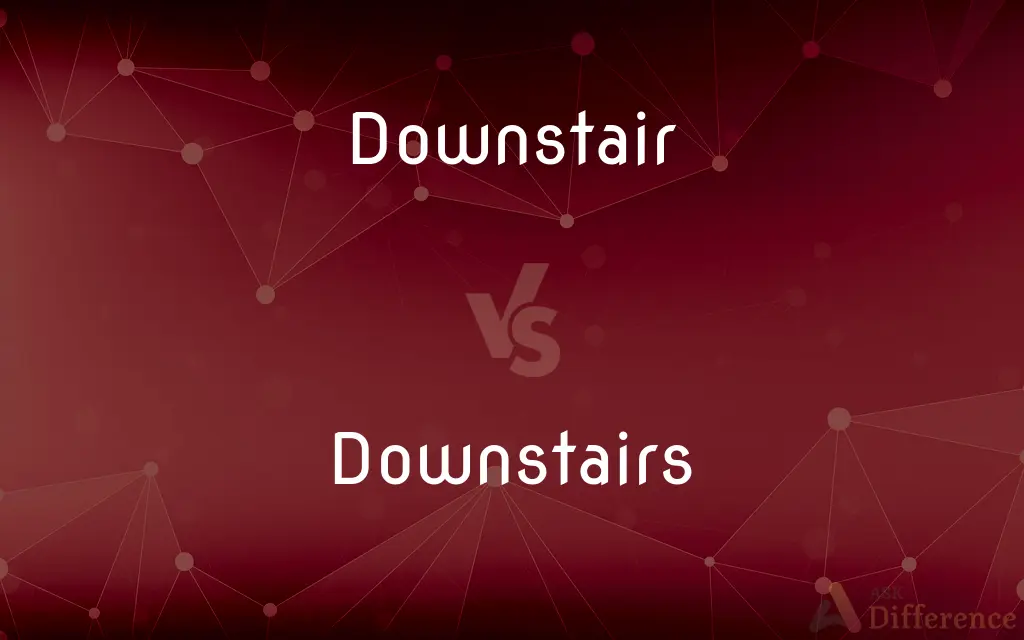Downstair vs. Downstairs — What's the Difference?
By Fiza Rafique & Maham Liaqat — Updated on March 8, 2024
"Downstair" is a less common form, typically incorrect in modern usage, while "downstairs" refers to the lower level of a building or being on that level.

Difference Between Downstair and Downstairs
Table of Contents
ADVERTISEMENT
Key Differences
"Downstair," although similar in appearance to "downstairs," is seldom used and often considered incorrect or a typographical error in contemporary English. It lacks the plural form that signifies the area or concept related to the lower level of a structure. On the other hand, "downstairs" is the correct term used to describe both the location within a building (the lower floor or levels) and the direction towards that area. It can function as an adverb, adjective, or noun, providing versatility in its usage.
When used as an adverb, "downstairs" describes the action of moving to the lower level of a building, as in "going downstairs for breakfast." Conversely, "downstair" does not conventionally function in this capacity due to its rarity and perceived incorrectness. As an adjective, "downstairs" can describe a location on the lower floor ("the downstairs bathroom"), a usage for which "downstair" is not applied.
As a noun, "downstairs" denotes the lower floor or floors of a building, illustrating its broader applicability compared to the nonstandard "downstair." For instance, one might say, "The living room is downstairs," to indicate the room's location within a building. The plural form in "downstairs" inherently communicates the concept of multiple steps or a collection of rooms at a lower level, something that "downstair" fails to convey accurately.
In contemporary usage, "downstairs" is universally recognized and understood, reflecting its correct application in referring to anything related to the lower part of a building. "Downstair," due to its limited and often incorrect use, does not share this level of acceptance or utility in modern English, highlighting the importance of using "downstairs" for clarity and correctness.
Comparison Chart
Common Usage
Rarely used, often incorrect
Widely used to refer to the lower level of a building
ADVERTISEMENT
Function
Lacks clear function in modern English
Serves as an adverb, adjective, and noun
Correctness
Considered incorrect or a typo
Correct term for indicating location or direction
Plurality
Does not convey plurality
Implies plurality (steps, levels, rooms)
Example Usage
N/A
"She heard a noise coming from downstairs."
Compare with Definitions
Downstair
(dated) downstairs
A downstair bedroom
Downstairs
Down the stairs
Raced my friend downstairs.
Downstair
On or of the lower floors of a building, especially the ground floor; as, the downstairs (or downstair phone; the house has no downstairs bathroom. Opposite of upstairs.
Downstairs
To or on a lower floor
Waited downstairs while her parents were getting dressed.
Downstair
On or of lower floors of a building;
The downstairs (or downstair) phone
Downstairs
The lower or main floor.
Downstairs
Located on a lower or main floor.
Downstairs
A floor lower than the current one.
Downstairs
Living, stepping, or coming down the stairs
Downstairs
The lower floor of a house, at ground level.
Downstairs
The genitalia.
The wind lifted up her skirt and I caught a glimpse of her downstairs.
Downstairs
Down the stairs; to a lower floor; as, she headed downstairs as soon as she heard the horn.
Downstairs
On or of lower floors of a building;
The downstairs (or downstair) phone
Downstairs
On a floor below;
The tenants live downstairs
Share Your Discovery

Previous Comparison
Make vs. Cause
Next Comparison
Veranda vs. PatioAuthor Spotlight
Written by
Fiza RafiqueFiza Rafique is a skilled content writer at AskDifference.com, where she meticulously refines and enhances written pieces. Drawing from her vast editorial expertise, Fiza ensures clarity, accuracy, and precision in every article. Passionate about language, she continually seeks to elevate the quality of content for readers worldwide.
Co-written by
Maham Liaqat















































